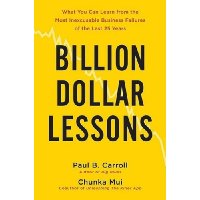| 商家名称 |
信用等级 |
购买信息 |
订购本书 |
|
|
 |
Billion-Dollar Lessons: What You Can Learn from the Most Inexcusable Business Fa |
 |
|
 |
Billion-Dollar Lessons: What You Can Learn from the Most Inexcusable Business Fa |
 |

基本信息·出版社:Portfolio Hardcover
·页码:310 页
·出版日期:2008年09月
·ISBN:1591842190
·条形码:9781591842194
·装帧:精装
·正文语种:英语
·外文书名:价值百亿美元的一堂课: 从全球金融危机中找到求生之道
内容简介 Welcome to Business Failure 101 In the 1960s, IBM CEO Tom Watson called an executive into his office after his venture lost $10 million. Watson asked the man if he knew why he’d been called in. The man said he assumed he was being fired. Watson told him, “Fired? Hell, I spent $10 million educating you. I just want to be sure you learned the right lessons.”
In
Billion-Dollar Lessons, Paul Carroll and Chunka Mui draw on research into more than 750 business failures to reveal the misguided tactics that mire companies again and again. There are thousands of books about successful companies but virtually none about the lessons to be learned from those that crash and burn.
Lesson One: The Cold Hard Facts Between 1981 and 2006, 423 major publicly held U.S. companies with combined assets totaling $1.5 trillion filed for bankruptcy. Hundreds more took huge write-offs, discontinued major operations, or were acquired under duress. Again and again, companies follow the same wrong-headed strategies that brought down businesses in the past. The sub-prime mortgage crisis that cost companies tens of billions of dollars in 2007 and 2008 echoes the ill-conceived strategies that pushed Green Tree Financial and Conseco into bankruptcy years earlier. Tom Watson’s executive’s $10 million lesson seems cheap by comparison.
Lesson Two: Failure Patterns Carroll and Mui found that the number one cause of failure was misguided strategy—not sloppy execution, poor leadership, or bad luck. These strategic errors fall into seven categories, including:
*Pursuing nonexistent synergies: Quaker Oats’ purchase of Snapple was supposed to capitalize on distribution synergies but instead led to a $1.7 billion write-off.
*Moving into an “adjacent” market that isn’t really adjacent: Avon decided its “culture of caring” qualified it to operate retirement homes. Subsequent write-offs totaled $545 million.
*Buying more problems than efficiencies through misguided consolidation: Despite pioneering the discount department store years before Sam Walton came along, Ames Department Stores flubbed consolidation efforts, landing in bankruptcy twice before eventually liquidating.
Lesson Three: Avoid Making the Same Mistakes But there’s light at the end of the tunnel:
Billion-Dollar Lessons provides proven methods that managers, boards, and even investors can adopt to avoid making the same mistakes. While there’s no way to guarantee success, this book draws on vivid, off-the-beaten-track examples to help you avoid failure by showing you how to thoroughly assess potentially disastrous strategies before they bring your company down.
Required Reading Think of
Billion-Dollar Lessons as the flip side of
Good to Great, but just as eye- opening and essential as that business classic. There’s enormous value in learning from companies that lost millions (if not billions) in pursuit of strategies that led to spectacular flameouts. Everyone makes mistakes, but why make the same mistakes over and over?
作者简介 Paul B. Carroll wrote for
The Wall Street Journal for seventeen years. The author of
Big Blues,/I>, he founded Context, the first “new economy” magazine, in 1997. Now a freelance writer, he lives outside Sacramento, California.
Chunka Mui is the coauthor of the major business bestseller Unleashing the Killer App and a fellow at Diamond Management and Technology Consultants. He lectures and consults widely on strategy and innovation, and lives in Chicago, Illinois.
编辑推荐 From Publishers Weekly
Carroll (Big Blues) and Mui (Unleashing the Killer App) collaborate to perform an autopsy on some of the most spectacular business failures and corporate disasters in recent times, hunting down the fatal strategies responsible. The authors examine more than 750 inexcusable corporate collapses, neatly cataloguing them into eight common failure patterns: doomed practices, including the Illusion of Synergies, as illustrated by the ruinous merger attempts by Sears and Dean Witter; Faulty Financial Engineering, as conducted by Tyco and Revco; Staying the (Misguided) Course Too Long, a sin committed by Kodak, which missed the boat on digital photography; and Consolidation Blues, as depicted by U.S. Airways, which crashed as a consequence of buying up too many companies too quickly. While there are assuredly lessons in defeat and the authors' detailed analysis and bracing honesty is welcome, readers hoping for a more encouraging or inspirational business book might find Carroll and Mui's avalanche of disastrous failures, avoidable bankruptcies and destruction of shareholder value a depressing—if highly instructive—read. (Sept.)
Copyright © Reed Business Information, a division of Reed Elsevier Inc. All rights reserved.
Review
“A fascinating study of business error and failure—couldn’t be more timely…Billion-Dollar Lessons is an insightful and crisply written book”
—Daniel Akst, The Wall Street Journal
“A worthwhile repository of wisdom.”
—Richard Pachter, Miami Herald
“An indictment of the bold and chowderheaded.”
—Leigh Buchanan, Inc. Magazine
“Well-researched and thought-provoking.”
–Mary Whaley, Booklist
“Fun to read…engaging.”
–BizEd
“A great read.”
—Marc Kramer, The Evening Bulletin




